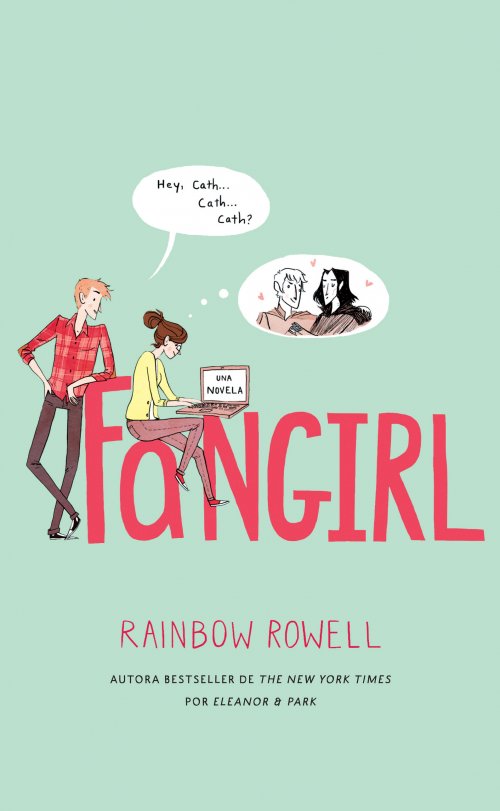¿Que te apetece leer?

 You started to write Fangirl while participating in the worldwide writing challenge NaNoWriMo back in 2011. How was the experience? Was the novel (writing style, plot...) influenced by its singular origin?
You started to write Fangirl while participating in the worldwide writing challenge NaNoWriMo back in 2011. How was the experience? Was the novel (writing style, plot...) influenced by its singular origin?
I wasn’t sure when I started that the NaNoWriMo model — writing a novel or 50,000 words in the month of November — would work for me. I thought it would be too chaotic and too fast.
But writing every day and writing so intensely helped me immerse myself in the story and get to know the characters much more quickly than usual. I just met the 50,000-word goal.
Fangirl is more than 100,000 words long, and there were at least two distinct drafts — so I definitely kept working for months after NaNoWriMo was over. But the heart of the book was written that November.
Some writers don't like fanfiction based on their stories. They don't like someone else "taking over" their work and leading their characters through paths they had not planned. Have you ever read fanfiction based on your stories? If so, what is the oddest thing you have come across?
I’m happy that people are writing fanfiction about my characters! It’s incredible to know that people are connecting to my books — and connecting in a way that’s inspiring them to make their own art and tell their own stories.
I don’t read the fanfiction because I’m not quite done with my characters, and I want to keep my headcanon straight. But I love to look at fan art. You can check out some of the fan art for my books here -- https://www.pinterest.com/rainbowrowell/
Both Fangirl and Eleanor and Park have protagonists who are a little different (physically and psychologically speaking) to those usually found in young adult literature nowadays. Do you consider this diversity of models important for the young people of our time?
I do think it’s important. I think that it’s good for readers – young readers, especially – to see that different kinds of people get to be heroes. That you don’t have to look a certain way or behave a certain way to fall in love or have adventures.
 Our Eleanor and Park's review got all kind of comments about the book last page. When you wrote that ending, did you imagine that it was going to be so controversial? Why did you choose that ending?
Our Eleanor and Park's review got all kind of comments about the book last page. When you wrote that ending, did you imagine that it was going to be so controversial? Why did you choose that ending?
I didn’t think it would be controversial – no. For me, the ending is open partly because Eleanor and Park are only 17. And 17-year-olds don’t get endings, you know? They get beginnings.
When I was writing it, I thought, “Okay, we’ve followed these two people as long as we can, for now. There’s hope – but wherever they’re going from here, we don’t get to go with them.”
Your next YA novel, Carry on, appears in Fangirl as a fanfic written by the protagonist. But you have already declared that you are not going to write as Gemma T. Leslie (Simon Snow's fictional writer) nor are you going to do it as Cath. Is the Carry on coming out in October the same one that we partially read in Fangirl, or is it something different?
The most common question I’ve been asked about Carry On is whether I’m writing as Cath or as Gemma T. Leslie … The answer is, I’m writing as me.
After I finished writing Fangirl, I kept thinking about Simon and Baz and the World of Mages … I wanted to write more about them, but I didn’t want to write the full series Gemma-style. And I also didn’t want to write through Cath’s hands and brain. I wanted to explore what I would do with this world and these characters.
So, even though I’m writing a book that was inspired by fictional fanfiction of a fictional series… I think what I’m writing now is canon.

 You have written novels for both adults and young people. Do you find the writing process different depending on the age of the reader?
You have written novels for both adults and young people. Do you find the writing process different depending on the age of the reader?
Well, I didn’t consciously make the switch to young adult – Eleanor & Park was just the story I wanted to tell next. But I’m very comfortable and happy writing YA. I’ve always read a lot of it.
One major difference I’ve noticed is how passionate and enthusiastic YA readers are, both teens and adults – and how kind and supportive other YA authors have been. It really feels like a big, vibrant community.
But the process is the same for me. I’m just trying to get into the characters’ heads.
Unfortunately, there are people who consider that young adult literature is simpler and more superficial (and, in short, worse) than the adult. As a writer of both kinds of books, what do you think about this?
If you think young adult books are simple, you probably haven’t read a lot of it. For me, there’s nothing inherently less sophisticated about YA books. Those late teen years are so profoundly important in all of our lives – and dramatic. It’s when we become the people we’re going to be. So it seems so natural to me that authors would want to write coming-of-age stories, and that people of all ages would want to read them.











